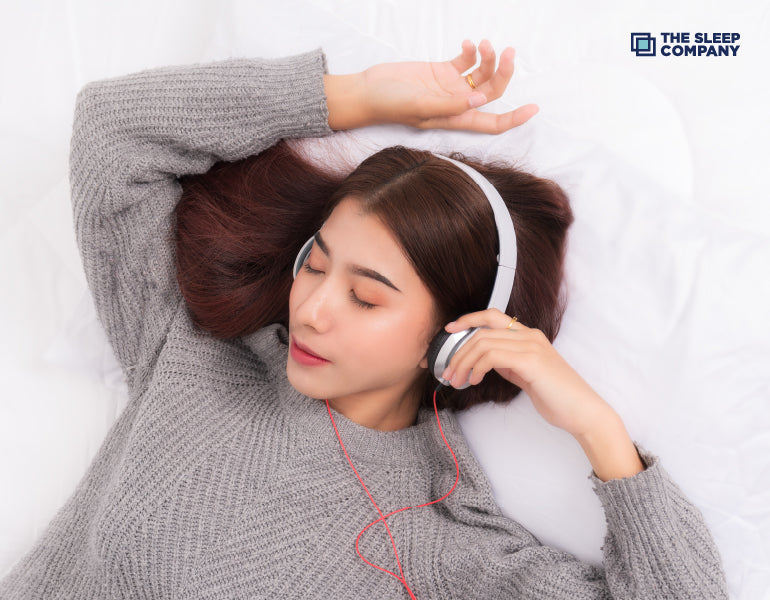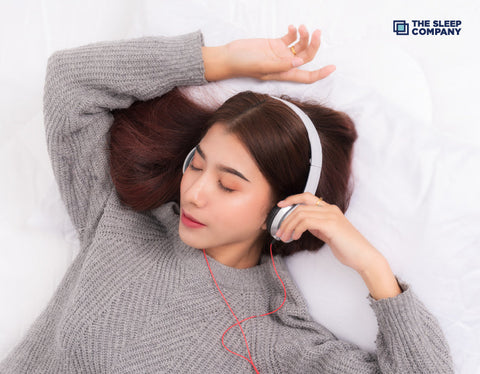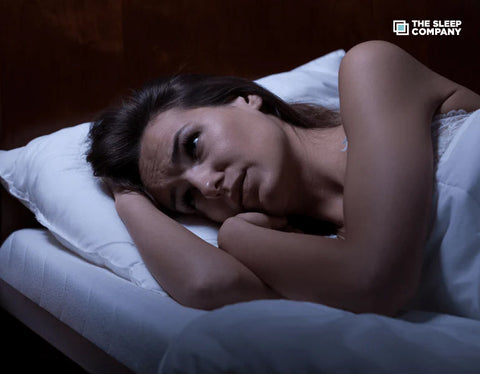My Cart

Brown Noise and Sleep

Brown noise is a sound frequency that can supposedly lull you to sleep almost effortlessly. It is known to relax your mind and even improve the quality of your sleep.
It is also commonly known as the red noise and is based on the principle of Brownian motion. This is where it gets its name from.
It was first observed by Scottish botanist Robert Brown in 1827 who noticed the random motion of particles suspended in fluid.
In recent times, white noise, pink noise, and even brown noise have started gaining immense popularity as a way to improve your sleep quality . All you have to do is play the audio sounds right before you hit the sheets.
But is it for you? Let's find out!
What Is Brown Noise?
Brown noise is nothing but a deep and soothing sound that can help you relax. A few popular examples of brown noise are the sound of strong wind, waterfalls, and thunder.
Brown noise is all about low frequencies. So, it's less harsh and can calm you quickly. It is often used to improve sleep quality or help you focus better on a task at hand. This is because brown noise can block any distracting noises.
How Does Brown Noise Help with Sleep?
One of the major sleep distractions today is too much noise. We have all been there, haven't we? A loud honk, people speaking to one another, construction work, etc., can disrupt your sleep.
So, imagine this. You have an early morning presentation that's already got you nervous. You just want to enjoy a peaceful shuteye so you can wake up fresh. However, random sounds, such as the traffic noise, keep you awake.
But with brown noise by your side, you don't have to worry. It masks the harsh sounds of your surroundings and offers a calming sleep environment.
It gives you a steady background score that can reduce any sudden disruptions. So, you are not only able to fall asleep faster but also stay asleep and enjoy quality slumber.
Brown Noise for Different Sleep Issues

As aforementioned, we have already established that brown noise can be a quality sleep companion. However, it can be especially beneficial for people suffering from the below-sleep conditions. Take a look!
1. People Who Find It Difficult To Fall Asleep Quickly
It is believed that the average time to fall asleep should be between 10 to 20 minutes. If you are exceeding this on a regular basis, it means you need help. One of the common reasons for this is the overthinking train most of us board at night. We reminisce over fights, review our failures, and whatnot!
So, in order to shut off the mind so you can snooze, brown noise is ideal. The deep, consistent tones make it easier for you to drift off.
2. Light Sleepers Who Get Disturbed Very Easily
Does every sudden noise wake you up? Maybe it's your partner's snore or a noise outside the window. Well, as a light sleeper, you can rely on brown noise.
The continuous background music is able to mask any sudden disruptions and let you snooze without a break. This lets you enjoy quality sleep so you wake up feeling your best self.
3. People Suffering From Tinnitus
Tinnitus is a condition where one hears ringing, buzzing, hissing, or other noises in the ears without any external sound present. So, this condition can make it difficult for you to concentrate and also fall asleep. While there is no cure as of now, brown noise can help.
The low frequencies of brown noise can help mask the ringing in the ears. This lets you fall asleep much more easily and helps you enjoy a quality slumber.
4. People Suffering From Insomnia
Insomnia is a condition where sleep eludes you. Despite the tossing and turning, it becomes increasingly difficult to drift off to a peaceful slumber. Here, brown noise can help.
Brown noise creates a peaceful environment that helps you relax. This helps you overcome the struggle of sleeplessness and easily fall asleep.
How to Incorporate Brown Noise into Your Sleep Routine?

Here are easy ways how you can create a sleep routinewith brown noise.
1. Choose A Device
There are several ways for you to enjoy brown noise. You can use a sound machine or just make use of your smartphone with Bluetooth speakers. You can find your preferred brown noise for free on streaming services or choose a dedicated app if needed.
2. Set A Timer
Once you have the device and streaming service in mind, make sure you play the music just before you hit the sheets. This will help you relax and unwind. While some keep it running through the night, you can also use a timer if necessary.
3. Keep The Volume Low
Keep the volume low, just enough to mask background sounds without being too loud or disturbing. This is almost like meditative music that runs in the background.
4. Pay Attention To Your Sleep Environment
Brown noise is the first step. You must combine it with other elements for the best results. For instance, make sure your mattress, pillows, and bedding fetch you absolute comfort. Dim the lights an hour before bed to get into the mood, and have a set of relaxing activities you can do before you fall asleep.
Other Benefits of Brown Noise

Here are a few other benefits of brown noise.
1. Boosts Your Productivity
As mentioned earlier, brown noise can calm the mind and help you focus better. So, whether you are reading, studying, or working, it can keep all distractions away. This boosts your productivity and you are able to finish your tasks on time.
2. Reduces Stress
Maybe you are in the middle of a workday and the stress is getting to you. Or perhaps you are looking to flush out the lingering stress after a long day. Here, brown noise can help. It creates a calming environment that can lower stress and anxiety levels.
3. Helps with Meditation
Brown noise can be your perfect meditation companion. It helps you stay in the moment and stops your mind from overthinking things. It is especially beneficial if you are new to this.
How to Listen To Brown Noise Safely?
Brown noise is harmless. But when you do it right, you can extract all its benefits. When you are using brown noise, make sure the volume is at a comfortable level. It should be like your background music.
If you are listening to it on headphones, take frequent breaks. Give your ears some rest.
For focus and relaxation, limit your listening sessions to about 1 to 3 hours. And, when it comes to sleep, avoid headphones.
Conclusion
If you have been struggling with sleep, you can give brown noise a try. Maybe it might not work the first time. Like any sleep aid, trial and error is important. When it comes to brown noise, there are several sounds you can choose from. So, experiment with it to find what works best for you.
Along with brown noise, make sure you have a cozy sleep environment with a comfortable mattress to support you.
At The Sleep Company, we bring you a range of SmartGrid mattresses, designed to help you experience the best sleep of your life. From pressure point relief to keeping you cool, our mattresses can do it all.
Explore The Sleep Company's SmartGrid mattresses today and discover the perfect balance of comfort and support for restful nights!
FAQs
Yes, sleeping with brown noise can be good for you. It creates a relaxing background sound that blocks out other noises. No more traffic noise or sounds coming from next door to disturb you. Instead, you fall asleep easily. It can also be a quick stress buster that can help you relax!
The best color noise for sleep can differ from one person to another. However, brown and pink noises are quite popular. You can try them both to see which one works well for you.
If you are feeling tired after listening to brown noise, it can be because it fully relaxes the mind. This can signal the brain that it's now time to sleep. If brown noise offers you extreme relaxation, it's best to use it for sleep.
The main difference between white and brown noise is their sound frequency. Examples of white noise include static from TV, the sound of the fan, etc. Whereas, brown noise is the deep ocean waves or sounds of a waterfall.





























































